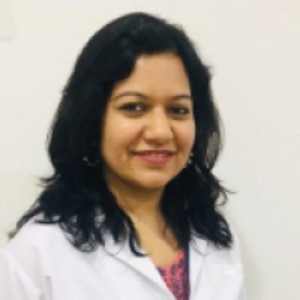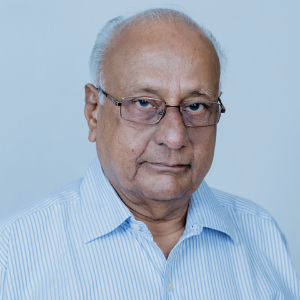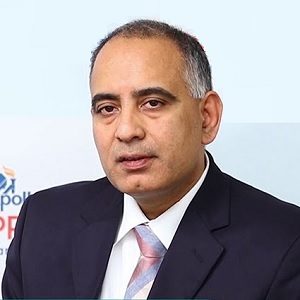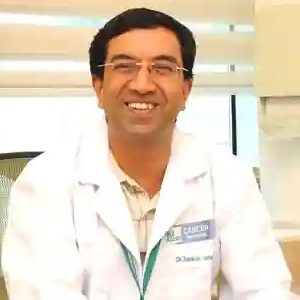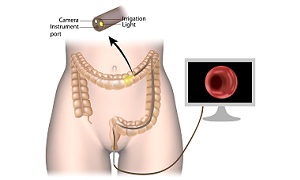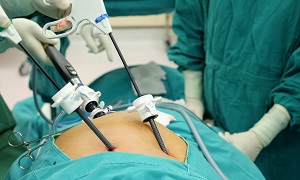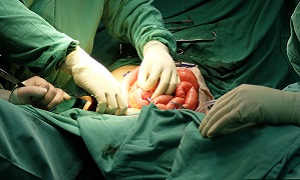Best Doctors in India for Colon Cancer treatment
- Medical Oncologist, Gurugram, India
- Over 20 years’ experience
Profile Highlights:
- Dr. Randeep Singh has trained extensively in managing cancer patients at the prestigious Tata Memorial Hospital, Mumbai.
- After spending over 20 years in this field, he has a vast experience in breast, lung, and gastrointestinal cancers.
- Throughout his career, Dr. Randeep Singh has had over 40 publications in national and international journals.
- He has also attended and presented various scientific papers in national and international journals.
- Surgical Oncologist, Gurugram, India
- Over 10 years’ experience
Profile Highlights:
- Dr. Shilpi Sharma is a highly experienced surgeon and oncologist who has previously worked in prestigious institutions such as Tata Memorial Hospital, and National Cancer Institute.
- Throughout her career, she has conducted various high-quality research in the field of head and neck cancers. Dr. Shilpi Sharma has also been part of various randomized and nonrandomized trials and has also been involved in clinical and translational research.
- She is also a member of ICMR guideline committee which formulated the ICMR guidelines on tongue cancers.
- Medical Oncologist, Chennai, India
- Over 40 years’ experience
Profile Highlights:
- Dr. Bellarmine Vincent Lawrence is a well-known Medical Oncologist in South India with a specialization in the treatment of breast cancers.
- He provides overall both pre and post-operative treatment of breast cancer that includes diagnostic, therapeutic as well as palliative care.
- He also provides services for other types of cancers including blood cancer and does procedures like Chemotherapy for the treatment and biopsies for the detection of cancer.
- Medical Oncologist and BMT Specialist, Chennai, India
- Over 25 years’ experience
Profile Highlights:
- Dr. T. Raja is a Medical Oncologist from the Tamil Nadu state with 25 years of know-how in this field.
- He has proficiency in Cancer Screening, Chemotherapy, PICC Line Insertion, Bone Marrow Transplantation, Stem Cell Transplantation, Pap collection, lymphoma, Renal Cell Cancer management, and Head and Neck Tumor.
- Dr. Raja was the Principal Investigator for several clinical studies, a published author for journals, and a teacher.
- Medical Oncologist, Chennai, India
- Over 28 years’ experience
Profile Highlights:
- Dr. Sankar Srinivasan is one of the top Medical Oncologists in India with proficiency in cancer management for about 28 years.
- He got certified in Internal Medicine, Medical Oncology, and Hematology from American Board to enhance his skills.
- Dr. Srinivasan is placed in the best 10% of the Hematologists boards.
- He is an active member of several International Medical Association Boards.
Best Hospitals in India for Colon Cancer treatment
CARE Hospitals, Hyderabad
- City: Hyderabad, India
Hospital Highlights:
- CARE Hospitals were established in the year 2000, by CARE Group.
- The multispecialty hospital has 435 beds, including 120 critical care beds, with an annual inflow of 180000 outpatients and 16,000 in-patients.
- The hospital provides specialty medical services in Cardiology, Cardiothoracic Surgery, Pediatric Cardiology, Pediatric Cardiothoracic Surgery, Neurology, Neurosurgery, Nephrology, and Urology.
- The hospital has the first dual source, 128 slice CT scanner (for high precision cardiac imaging) – the first of its kind in south India.
- The hospital offers a wide range of accommodation facilities for the convenience of its varied patient base, ranging from general wards to super deluxe rooms.
Fortis Hiranandani Hospital, Mumbai
- City: Mumbai, India
Hospital Highlights:
- Fortis Hiranandani hospital was established in 2007.
- The hospital is an advanced tertiary care, multi-specialty hospital equipped with 149 beds.
- The hospital is equipped with a super ICU to provide emergency medical care to critically ill patients.
- The hospital is NABH accredited.
- The critical care facility in the hospital is augmented with the state-of-the-art facilities that facilitate speedier diagnosis and efficient monitoring.
- The hospital provides specialty medical services in cardiology, orthopedic science, pediatric science, neurology, diabetic care, urology, nephrology, ENT, obstetrics, gynecology, cosmetic surgery, bariatric surgery, neuro and spine care.
Fortis Hospital, Anandpur, Kolkata
- City: Kolkata, India
Hospital Highlights:
- Fortis Hospital, Anandapur, Kolkata is a world-class super-speciality equipped with the latest technologies in the medical world.
- The hospital is NABH accredited.
- This state-of-the-art facility specializes in cardiology and cardiac surgery, urology, nephrology, neurosciences, orthopaedics, digestive care, emergency care and critical care.
- The hospital, governed by integrated Building Management System (IBMS), has a pneumatic chute system, for quick vertical and horizontal transportation between floors, facilitating speedy transfer of patient specimens, documents, reports, and medicines to the concerned departments.
- The hospital also has a nephrology department with over 28 advanced dialysis units.
Fortis Hospital Banerghatta, Bengaluru
- City: Bengaluru, India
Hospital Highlights:
- Fortis Hospital Bannerghatta, Bengaluru was established in 2006.
- The hospital is a 276 bedded multi-specialty tertiary care facility.
- The hospital specializes in cutting-edge medical technology and dedicated patient care services.
- The hospital is equipped with state-of-the-art technologies like trans-radial angioplasty, trans-abdominal cardiac surgery, and computerized TKR navigation surgery.
- The hospital provides specialty medical services in cardiology, cardiac surgery, orthopedics, neurology, neuro-surgery, GI, and Minimal Access Surgery (MAS).
Gleneagles Global Hospital, Parel, Mumbai
- City: Mumbai, India
Hospital Highlights:
- Gleneagles Global Hospital The 450-bed facility comprises of 17-stories, housing state-of-the-art infrastructure, and advanced medical care facilities.
- The hospital offers end-to-end clinical, surgical, and diagnostic services. It is equipped with a team of eminent medical professionals aided by qualified nurses and medical staff
- The Hospital offers advanced Endoscopic procedures, Hepatobiliary and Liver Surgeries, Surgical and Medical Gastroenterology, Bariatric Surgery, and Robotic surgery.
- The hospital is a center of excellence for Orthopedics, Joint Replacement, Knee Replacement, and Hip Replacement surgery.
Jaypee Hospital, Noida
- City: Noida, India
Hospital Highlights:
- Jaypee Hospital is the flagship hospital of the Jaypee Group.
- This hospital has commissioned 525 beds in the first phase and has been planned and designed as a 1200 bedded multi-specialty facility.
- It holds the accreditation of the NABH and NABL.
- The hospital has state-of-the-art infrastructure equipped with the latest technologies and modern equipment like 64 Slice PET CT, Dual Head 6 Slice SPECT CT, Gamma Camera, and Da Vinci Robotic Surgery for comprehensive robotic surgical solutions.
- It has special Centers dedicated to the major specialties to provide hassle-free and high-quality clinical care.
Manipal Hospital, Dwarka, Delhi
- City: New Delhi, India
Hospital Highlights:
- Manipal Hospitals, Dwarka, is a super-specialty hospital in Dwarka, New Delhi, which is a part of Manipal Hospitals Group.
- The hospital aims to provide the best treatment on par with international standards at a fraction of the cost.
- Equipped with 380 beds, the hospital is also one of the new age hospitals which are equipped fully with state-of-the-art infrastructure, cutting-edge technology as well as the latest and advanced clinical practices. The hospital also has 13 modular Operation theatres with 118 beds which are solely meant for critical care.
- The hospital comprises internationally acclaimed doctors and highly professional and experienced hospital and medical staff who are able to provide preventive, therapeutic, and diagnostic services all under one roof.
Pushpawati Singhania Hospital & Research Institute, New Delhi
- City: New Delhi, India
Hospital Highlights:
- Established in 1996, Pushpawati Singhania Research Institute is one of the top hospitals in the NCR region, as well as one of the top facilities in India for gastroenterology. The hospital is one of South Asia’s first institutes in medical and surgical treatment for diseases related to digestion.
- The hospital is equipped with state-of-the art facilities coupled with the latest equipment as well as renowned consultants from various parts of India as well as other parts of the world.
W Pratiksha Hospital, Gurgaon
- City: Gurugram, India
Hospital Highlights:
- W Pratiksha Hospital, Gurugram, is one of the best hospitals in the NCR region. It is also a top hospital in India for IVF. Since its inception, the hospital has performed over 5500 successful IVFs. The hospital also specializes in gynecology.
- With over 20 years of experience in providing quality healthcare, the hospital is known as one of the most trusted and valued health providers in India.
- Equipped with world-class medical facilities and advanced technology, the hospital’s doctors and clinicians also have a track record of delivering excellent results. The hospital is also known for focusing on preventive well-being as much as on curative treatment.
- The hospital has earned the trust of its patients, by providing the best available treatments at affordable costs.
Narayana Superspeciality Hospital, Gurugram
- City: Gurugram, India
Hospital Highlights:
- Situated near DLF Cyber City, Gurugram, Narayana Superspecialty Hospital is one of the top medical facilities in the Delhi NCR region, catering to the needs of the people. Known for its commitment to quality medical care and patient service, the hospital is a state-of-the-art facility with planned and well-equipped sections, which includes a spacious OPD area as well as comfortable patient rooms.
- It is the closest super-specialty hospital from Indira Gandhi International Airport towards Gurugram, and also the nearest super specialty hospital from DLF Cyber City. It is also close to major residential areas in Gurugram.
- It is part of the renowned Narayana Health Group. Established in 2000, by Dr. Devi Shetty, a renowned cardiac surgeon, it has grown to be one fo India’s leading healthcare groups.
COLON CANCER
Cancer is one of the diseases that involve abnormal growth of cells. This is an uncontrollable disease that can even affect other parts of the body. One such type of cancer is colon cancer, which affects the digestive tract. Cancer starts from the large intestine and reaches the colon, which is the last part of the digestive system. The disease generally affects the ones who are older in age, but the disease is not age bound and affects the person of any age.
Colon cancer, which is also known as colorectal cancer is the one that starts as a non-cancerous cluster of cells in the initial stage. These clusters form inside the colon and are known as polyps. As time passes, some of the polyps turn cancerous, which can lead to colon cancer. Colon cancer is a type of cancer that can be controlled. One can get treated by various methods like drug treatments, surgery, and radiation therapy.
Cause of Colon Cancer
For prevention one should be aware of the causes of the disease. Though doctors are not sure what are the main causes behind the spread of the colon cancer, the disease starts when the healthy cells in the colon change their DNA (mutation).
In general, the cells are healthy, they grow and divide, to keep the functioning of the body in order. But as the DNA of the cells gets damaged, it can become cancerous. This does not stop the division of cells, instead, they continue to grow and form a tumor. This cancerous cell, with time, grows and can affect other normal tissues. It can further affect the other parts of the body.
Symptoms of Colon Cancer
Some of the symptoms that can help you know if you are suffering from colon cancer are as follows:
- One of the symptoms of cancer is the change in bowel habits. The patient suffering from colon cancer may experience constipation or diarrhea. It can even lead to a change in the consistency of the stools of the patient.
- One can experience bleeding in stools or in the rectum.
- A patient suffering from colon cancer will undergo never-ending abdominal discomfort. These include cramps, gas, or pain.
- One can undergo an unexpected weight loss.
- Weakness and fatigue are the symptoms that can be an alarm for you to check yourself.
The person undergoing these symptoms should see the doctor as soon as possible as these can be the symptoms about the start of the colon cancer. Also, the symptoms may vary according to the size and location of cancer in the patient’s large intestine.
Diagnosis of Colon Cancer
Screening
For healthy people with no possible signs & symptoms, doctors recommend some screening tests to look for the non-cancerous colon polyps and signs of colon cancer. Figuring out the disease in its initial stage indicates higher chances of favorable treatment and a cure. Screening reduces your risk of dying because of colon cancer. Most of the people with a risk of colon cancer undergo screening around the age of 50 years. There are myriad screening options, each with their own drawbacks and benefits. When the doctor performs colonoscopy for screening, it is possible to remove the polyps before they turn into cancer.
Colonoscopy
Colonoscopy involves using a long, slender & flexible tube attached to a video camera and monitor. It helps the doctor to view the rectum and colon. Your doctor will pass surgical tools through the tube for collecting tissue samples, if he or she finds any suspicious areas. Next, the doctor will perform analysis and remove the polyps.
Blood tests
Treatment options for Colon Cancer
Surgery
Surgery for early-stage cancer
Your doctor will perform a minimally invasive approach to surgery, if your colon cancer is at its initial stages.
- Polypectomy– If your cancer is in its early stage, localized, contained with a polyp, and small, then your doctor will remove it completely in a procedure called colonoscopy.
- Endoscopic mucosal resection – Your doctor may remove the larger polyps during colonoscopy with the help of special tools. He or she may also remove the inner lining of the colon through endoscopic mucosal resection.
- Laparoscopic surgery –It is a minimally invasive surgery and removes polyps that colonoscopy doesn’t remove. Your surgeon will give numerous small incisions in the abdominal wall and insert the instruments with cameras to display the colon on your monitor during the procedure.
Surgery for advanced-stage cancer
- Partial colectomy– Your doctor will remove a part of your colon containing cancer along with a margin of the normal tissue during the procedure.
- Ostomy- This procedure involves creating an opening in the abdominal wall from a portion of the bowel. It held the elimination of stools in a bag that fits over the opening. The procedure is temporary sometimes to allow the colon or rectum to heal. However, it may be permanent in some cases.
- Lymph node removal- Your surgeon will remove the nearby lymph nodes during the surgery.
Surgery for very advanced cancer
Chemotherapy
Radiation therapy
Targeted drug therapy
Immunotherapy

Palliative care



